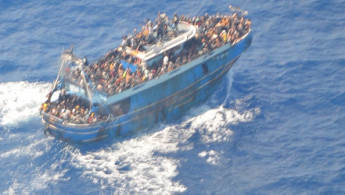Syrians in Daraa desperately search for loved ones after Greece boat tragedy
Syrians are desperately searching for loved ones after a boat carrying hundreds of refugees sank off the coast of a Greek island on the morning of 14 June, with as many as 560 passengers still missing.
The boat was carrying around 750 passengers with 104 rescued and 78 confirmed dead.
Rescue services are still looking for the missing passengers where the vessel went down, although hopes for survivors are dwindling.
At least 70 of the passengers on the ship were from the southern Syrian province of Daraa, Nedal al-Amari, an activist from Daraa and a relative of a ship’s passenger, told The New Arab.
TNA was provided with a list of 56 names of passengers from Daraa, the majority of which were still missing. It could not independently verify the list.
"His family is crying all the time, they just want to be sure if he is alive or dead. Every minute they ask me if I have any information, but unfortunately, I really don’t have any," Al-Amari said.
Families of the other missing family members have been calling Syrians they knew in Europe desperate for news of their loved ones.
According to Al-Amari, his 18-year-old cousin decided to attempt the dangerous journey to Italy to avoid mandatory military service in Syria.
Soldiers from formerly rebel-held Daraa are often sent to serve in regime frontlines either in northwest Syria against rebels or central Syria where they are exposed to attacks from the Islamic State group (IS).
Daraa province has been plagued by lawlessness since being reconquered by the Syrian regime in 2018. Armed gangs commit kidnappings and assassinations with impunity.
Each passenger from Daraa was made to pay smugglers €5000 for the journey, Ahmad said.
Pictures of the vessel released by the Greek coast guard showed a dangerously overcrowded boat.
Children were reportedly placed below the hull of the ship due to inclement weather, endangering their lives once the ship sank.
The boat reportedly departed from Egypt, before making a stop in Tripoli and heading for Italy.
Alarm Phone, an organisation which coordinates search and rescue operations in the Mediterranean, said that Greek and other European authorities were aware that the boat was in distress, but did not launch a rescue operation.
Greek authorities said that the vessel did not want to be rescued by Greece, but Alarm Phone argued that this is due to fear of the Hellenic Coast Guard’s known history of pushbacks and violence.
Since 1991, 51,000 people have died trying to reach Europe by boat.
According to the UN, the first quarter of 2023 was the deadliest in six years for migrants in the central Mediterranean.
Amnesty International said in a statement on Friday that EU asylum and migration policies, "which are built on deterrence and systematic detention" will probably cause more pushbacks and deaths at sea.
"For too many years, we have heard empty words from the European Commission and EU member states being ‘concerned’ … by the loss of life without taking action. This time must be different," the statement read.




 Follow the Middle East's top stories in English at The New Arab on Google News
Follow the Middle East's top stories in English at The New Arab on Google News


